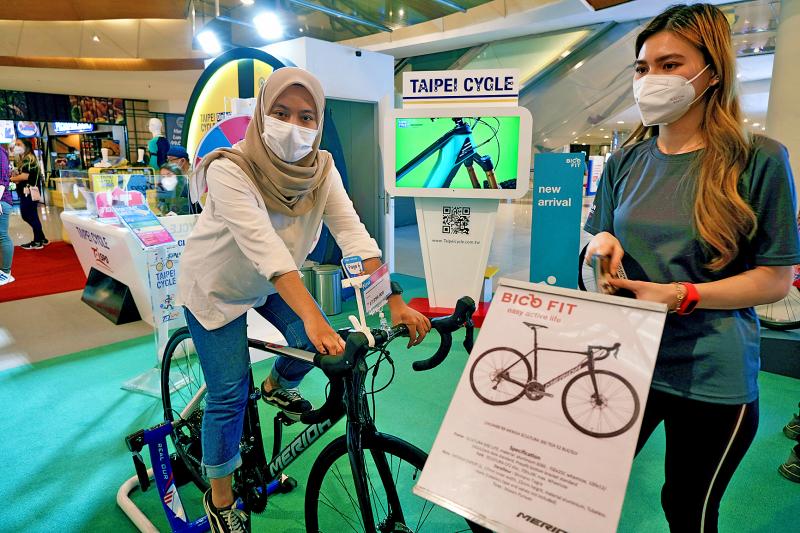Bicycle maker Merida Industry Co Ltd (美利達) last week reported annual declines in shipments and revenue for last month, as it continued to face shortages of components and shipping containers.
Consolidated revenue last month dropped 24.04 percent year-on-year to NT$1.82 billion (US$64.89 million), while 78,801 units were shipped, a decline of 25.47 percent, the company said in a statement on Friday.
“The supply of components is still very unstable,” Merida said.

Photo: CNA
In addition, “shipping space is limited and the container shortage remains. Thus far, we still have about 15,000 bikes waiting to be shipped,” it said.
The month had fewer working days and Merida is transitioning to a new enterprise resource planning (ERP) system, which also contributed to its reduced output and decline in sales, the company said.
Merida launched the new ERP system early last month, but the switching from the old system disrupted production, it said, adding that it expects production utilization to improve as the new ERP system is running more smoothly every day.
From January to last month, the company shipped 930,436 bicycles, up 12.49 percent from the same period of last year, while combined revenue over the nine-month period increased 12.87 percent year-on-year to NT$22.76 billion.
Merida’s revenue is expected to rise from NT$7.46 billion last quarter to NT$8.43 billion this quarter, as some shipments would be delayed from last quarter to this quarter, Yuanta Securities Investment Consulting Co (元大投顧) said in a note on Friday.
As end-market inventories in the US and Europe are less than one month amid sustained demand, and electric bike demand remains robust in those markets, Merida’s revenue for this year could reach NT$31.03 billion, up from NT$27.07 billion last year, Yuanta said.
Separately, Giant Manufacturing Co Ltd (巨大機械) on Friday reported that its revenue for last month rose 1.09 percent year-on-year to NT$6.52 billion as demand remained strong in the US and Europe.
That brought the company’s cumulative revenue in the first nine months to NT$61.9 billion — an annual increase of 17.83 percent.

UNCERTAINTY: Innolux activated a stringent supply chain management mechanism, as it did during the COVID-19 pandemic, to ensure optimal inventory levels for customers Flat-panel display makers AUO Corp (友達) and Innolux Corp (群創) yesterday said that about 12 to 20 percent of their display business is at risk of potential US tariffs and that they would relocate production or shipment destinations to mitigate the levies’ effects. US tariffs would have a direct impact of US$200 million on AUO’s revenue, company chairman Paul Peng (彭雙浪) told reporters on the sidelines of the Touch Taiwan trade show in Taipei yesterday. That would make up about 12 percent of the company’s overall revenue. To cope with the tariff uncertainty, AUO plans to allocate its production to manufacturing facilities in

TAKING STOCK: A Taiwanese cookware firm in Vietnam urged customers to assess inventory or place orders early so shipments can reach the US while tariffs are paused Taiwanese businesses in Vietnam are exploring alternatives after the White House imposed a 46 percent import duty on Vietnamese goods, following US President Donald Trump’s announcement of “reciprocal” tariffs on the US’ trading partners. Lo Shih-liang (羅世良), chairman of Brico Industry Co (裕茂工業), a Taiwanese company that manufactures cast iron cookware and stove components in Vietnam, said that more than 40 percent of his business was tied to the US market, describing the constant US policy shifts as an emotional roller coaster. “I work during the day and stay up all night watching the news. I’ve been following US news until 3am

COLLABORATION: Given Taiwan’s key position in global supply chains, the US firm is discussing strategies with local partners and clients to deal with global uncertainties Advanced Micro Devices Inc (AMD) yesterday said it is meeting with local ecosystem partners, including Taiwan Semiconductor Manufacturing Co (TSMC, 台積電), to discuss strategies, including long-term manufacturing, to navigate uncertainties such as US tariffs, as Taiwan occupies an important position in global supply chains. AMD chief executive officer Lisa Su (蘇姿丰) told reporters that Taiwan is an important part of the chip designer’s ecosystem and she is discussing with partners and customers in Taiwan to forge strong collaborations on different areas during this critical period. AMD has just become the first artificial-intelligence (AI) server chip customer of TSMC to utilize its advanced

Six years ago, LVMH’s billionaire CEO Bernard Arnault and US President Donald Trump cut the blue ribbon on a factory in rural Texas that would make designer handbags for Louis Vuitton, one of the world’s best-known luxury brands. However, since the high-profile opening, the factory has faced a host of problems limiting production, 11 former Louis Vuitton employees said. The site has consistently ranked among the worst-performing for Louis Vuitton globally, “significantly” underperforming other facilities, said three former Louis Vuitton workers and a senior industry source, who cited internal rankings shared with staff. The plant’s problems — which have not